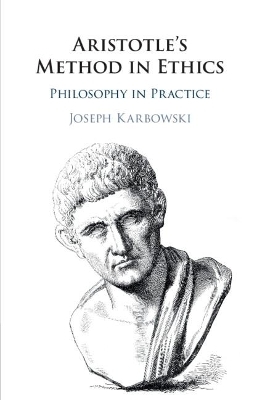
Aristotle's Method in Ethics
Philosophy in Practice
Seiten
2021
Cambridge University Press (Verlag)
978-1-108-41145-5 (ISBN)
Cambridge University Press (Verlag)
978-1-108-41145-5 (ISBN)
This book argues for a scientific interpretation of Aristotle's ethical method and takes an innovative approach toward understanding his conception of philosophy. It will interest readers working in the fields of philosophy, classics, political theory, history of ethics, and the relation between philosophy and science.
This book examines Aristotle's method in ethics from the vantage point of his broader conception of philosophy. Joseph Karbowski challenges longstanding dialectical orthodoxy and argues instead that, in his ethical treatises, Aristotle is seeking the first principles of a demonstrative ethical science, a science of human goodness, using an ethically adapted version of the method described in the second book of his Posterior Analytics. Part I of this volume develops a novel interpretation of Aristotle's conception of philosophy, which highlights its ambition to scientific knowledge (epistēmē) and its flexible approach to philosophical inquiry. Part II then demonstrates Aristotle's scientific and flexible approach to philosophy at work in his ethical treatises. The book shows how the aspiration to scientific knowledge is compatible with Aristotle's remarks about ethical precision, the practical aim of ethics, and the particular orientedness of phronēsis (practical wisdom).
This book examines Aristotle's method in ethics from the vantage point of his broader conception of philosophy. Joseph Karbowski challenges longstanding dialectical orthodoxy and argues instead that, in his ethical treatises, Aristotle is seeking the first principles of a demonstrative ethical science, a science of human goodness, using an ethically adapted version of the method described in the second book of his Posterior Analytics. Part I of this volume develops a novel interpretation of Aristotle's conception of philosophy, which highlights its ambition to scientific knowledge (epistēmē) and its flexible approach to philosophical inquiry. Part II then demonstrates Aristotle's scientific and flexible approach to philosophy at work in his ethical treatises. The book shows how the aspiration to scientific knowledge is compatible with Aristotle's remarks about ethical precision, the practical aim of ethics, and the particular orientedness of phronēsis (practical wisdom).
Joseph Karbowski is Visiting Assistant Professor in the Philosophy Department at the University of Pittsburgh. He has published numerous articles on Aristotle's ethics, politics, epistemology, philosophy of science, and natural philosophy.
Introduction; Part I. The Nature of Aristotelian Philosophy: 1. Dialectical reasoning and the dialectical craft; 2. The enterprise of philosophy; 3. Aristotle's scientific and flexible philosophical method; Part II. Philosophy in Practice: 4. Method in the Eudemian Ethics; 5. Ethical precision and the practical necessity of epistēmē; 6. Facts, principles, and Aristotle's demonstrative ethical science; 7. Strategic flexibility in the Nicomachean Ethics; 8. The autonomy of ethics; Conclusion.
| Erscheinungsdatum | 05.02.2021 |
|---|---|
| Zusatzinfo | Worked examples or Exercises |
| Verlagsort | Cambridge |
| Sprache | englisch |
| Maße | 150 x 230 mm |
| Gewicht | 420 g |
| Themenwelt | Geisteswissenschaften ► Philosophie ► Ethik |
| Geisteswissenschaften ► Philosophie ► Philosophie Altertum / Antike | |
| ISBN-10 | 1-108-41145-2 / 1108411452 |
| ISBN-13 | 978-1-108-41145-5 / 9781108411455 |
| Zustand | Neuware |
| Haben Sie eine Frage zum Produkt? |
Mehr entdecken
aus dem Bereich
aus dem Bereich
unsere kollektive Verantwortung
Buch | Hardcover (2023)
wbg Theiss in Wissenschaftliche Buchgesellschaft (WBG) (Verlag)
CHF 46,90


